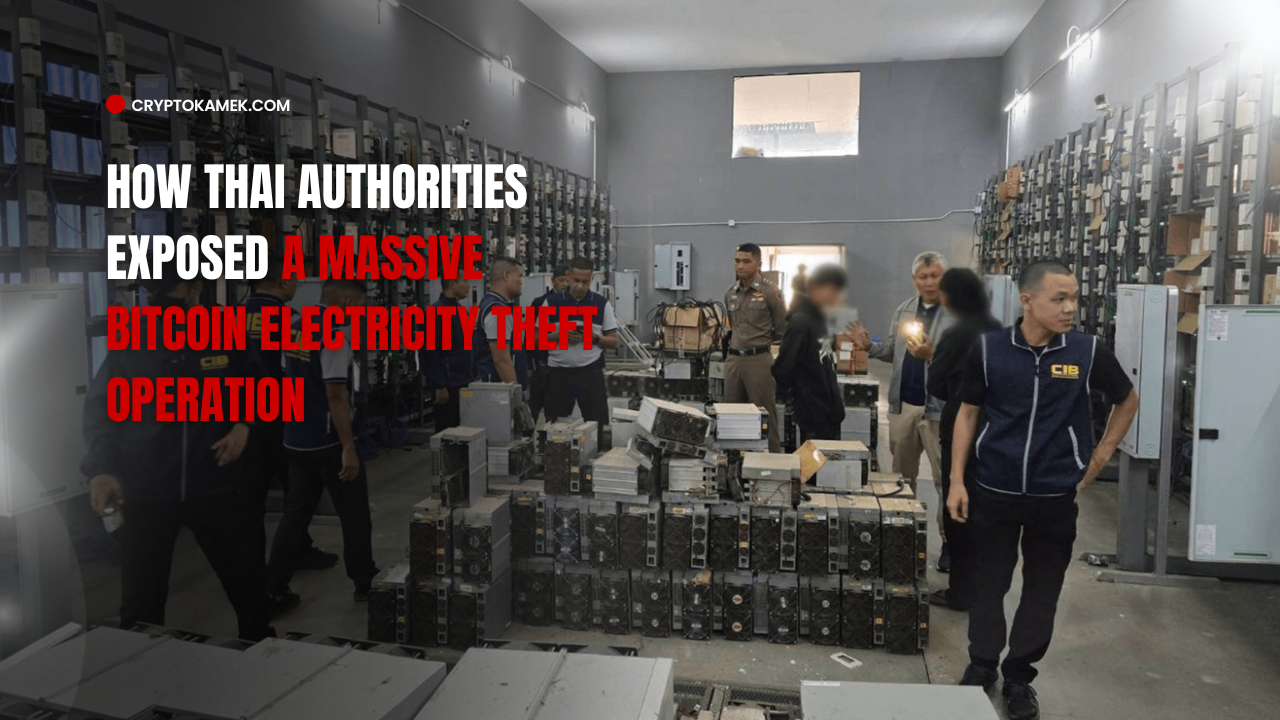

Thai Authorities Raid Bitcoin Farm for Electricity Theft
Highlights:
- Thai authorities raided a Bitcoin mining farm in Chonburi, seizing 996 mining machines.
- The operation uncovered electricity theft, a significant issue in illegal cryptocurrency mining.
- Miners employed tactics like electricity meter tampering and nighttime power tapping to evade detection.
- The Provincial Electricity Authority (PEA) reported severe financial losses caused by illegal mining.
- Thailand’s cryptocurrency regulations face challenges in addressing unregistered and illegal mining operations.
- The raid underscores a global issue of power theft linked to cryptocurrency mining.
- Authorities emphasize the importance of adopting sustainable and energy-efficient practices in the crypto sector.
A recent raid in Thailand has brought to light the dark side of cryptocurrency mining. Thai authorities have cracked down on a Bitcoin mining farm involved in electricity theft, shedding light on a growing issue in the crypto industry. The operation targeted illegal activities threatening the nation’s energy infrastructure, raising questions about sustainability and accountability.
In this article, we will uncover the details of this raid, explore the methods used by miners to steal electricity, and discuss the broader implications for Thailand and the global crypto community.
The Raid on the Bitcoin Mining Farm
On January 8, 2025, a Bitcoin mining farm in Phanat Nikhom, Chonburi, was raided by Thai authorities. The operation, carried out by the Provincial Electricity Authority (PEA) in collaboration with the Crime Suppression Division (CSD), exposed illegal mining operations of staggering proportions.
Officials seized 996 Bitcoin mining machines, a significant find that underscored the scale of the operation. These machines consumed vast amounts of electricity daily, yet the operators had evaded detection for months.
The success of the raid was attributed to advanced monitoring systems used by the PEA, which flagged irregularities in electricity usage in the area. Collaboration between the PEA and the CSD ensured swift action, minimizing further losses to the country’s energy supply.
Techniques Used by Miners to Manipulate Electricity Usage
Illegal Bitcoin miners employ various tactics to avoid paying for the electricity they consume. One common method is electricity meter tampering, where miners alter the meters to underreport energy usage.
Another method involves tapping into electrical lines at night when activity is harder to detect. These strategies not only steal power but also jeopardize the safety of local communities due to the risk of electrical fires or overloads.
In some cases, unregistered miners operate from remote locations, using off-grid setups to avoid detection entirely. However, the high power demands of mining often give them away.
Impact of Illegal Mining on Thailand’s Energy Supply
Illegal mining activities place an enormous strain on Thailand’s energy resources. The PEA has reported significant financial losses due to power theft, with unregulated crypto mining being a major contributor.
This strain can disrupt energy distribution, leading to outages in affected areas. The environmental cost is also significant, as mining farms generate substantial heat and require additional resources to maintain cooling systems.
Thailand has faced similar issues in the past, with authorities conducting raids on smaller mining farms. However, the scale of this operation in Chonburi sets it apart as one of the largest busts in the country’s history.
Thailand’s Regulatory Framework for Cryptocurrencies
Thailand has taken significant steps to regulate cryptocurrency activities, but challenges remain. The country’s Securities and Exchange Commission (SEC) oversees digital asset trading and has established rules for exchanges and initial coin offerings (ICOs).
Despite these measures, enforcing regulations on illegal mining operations is a complex task. The anonymity of cryptocurrencies, combined with the decentralized nature of blockchain technology, makes it difficult to trace offenders.
Authorities are working to strengthen their framework, including stricter penalties for those caught engaging in illegal mining activities. Public awareness campaigns also play a role in deterring potential offenders.
Government Response to Illegal Mining Operations
The recent raid has prompted Thai authorities to take decisive action. Following the seizure of equipment, officials are preparing to arrest those involved in the operation.
The Crime Suppression Division has reaffirmed its commitment to tackling illegal mining, emphasizing the need for vigilance in monitoring electricity usage. By targeting these operations, the government aims to protect the country’s energy resources and maintain trust in the crypto industry.
The Global Context of Illegal Mining Activities
Thailand is not alone in facing the challenges of illegal crypto mining. Countries like Malaysia have reported similar issues, with authorities confiscating thousands of mining rigs in recent years.
Globally, power theft for cryptocurrency mining has resulted in billions of dollars in losses. The lack of a unified regulatory approach complicates efforts to combat the problem, as miners often relocate to jurisdictions with less stringent rules.
Some governments are exploring innovative solutions, such as incentivizing legal mining operations to adopt renewable energy sources. These measures could help mitigate the environmental impact while curbing illegal activities.
Conclusion: A Call for Sustainable Practices in Cryptocurrency Mining
The raid on the Bitcoin mining farm in Chonburi serves as a stark reminder of the challenges posed by illegal crypto mining. Balancing innovation with sustainability is crucial for the future of the cryptocurrency industry.
Governments, industry stakeholders, and energy providers must collaborate to develop effective strategies for managing energy consumption. By promoting transparent practices and investing in renewable energy solutions, the crypto sector can thrive without compromising the environment or public resources.
References:






